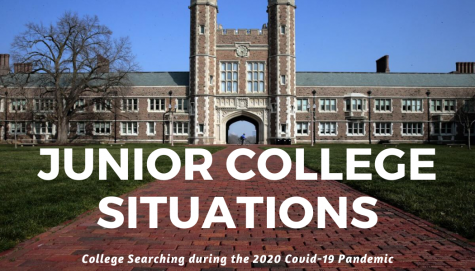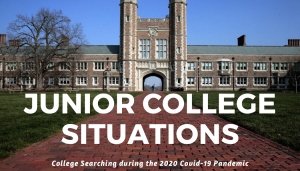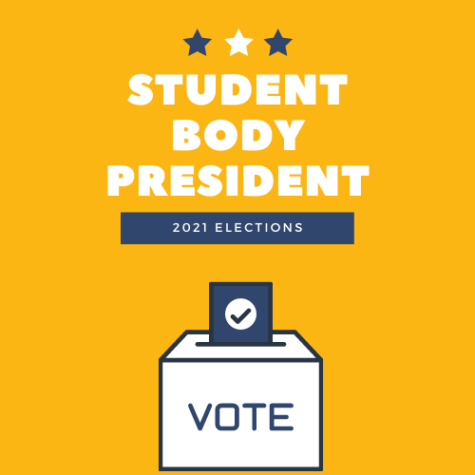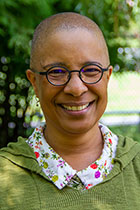College “Counseling”

December 27, 2020
At Burroughs, 100% of the senior class goes on to seek higher education after graduation. Therefore, during the fall semester, the college admissions process undoubtedly consumes seniors’ thoughts. A significant proportion of the class seeks admission at top-ranked universities across the country, where the acceptance rate is low and the number of applicants is high. College admissions are becoming more competitive than ever before, and this trend does not show signs of stopping. Since the 20th century, the amount of students attending colleges or universities has more than doubled in proportion to the population. As this number continues to rise in recent years, top schools have not expanded their enrollment significantly. This means that acceptance percentages are driven lower, even to the single-digits in instances at especially elite institutions.
This year especially, more students are applying to schools which might be considered ‘reaches’ (schools at which your admission outcome is very unsure) “perhaps believing they will have a better chance of admission with test-optional policies and fears that colleges may have about meeting their enrollment targets,” as Head of College Counseling, Ms. Nanette Tarbouni, postulates.
As acceptance rates fall because of increasing application numbers, it leaves students searching for any way to get ahead of others at the most selective schools. Everyone wants to get into their dream school, and with easy access to information through the internet, it is easy to fall down a rabbit hole of analyzing yourself through an admissions officer’s perspective. Questions such as “How to be a competitive applicant to [SCHOOL],” “What looks good on college applications,” “How to stand out to colleges,” “What ACT/SAT score do I need for [SCHOOL]” are just some samples of popular questions students might google or watch a Youtube video about. The websites Burroughs uses to organize the process, previously Naviance and now Cialfo, enable students to dive deeply into the admissions history of the colleges JBS students have applied to in the last 5 years.
“At Burroughs, 100% of the senior class goes on to seek higher education after graduation.”
When looking at a highly-rated college, noticing the percentage of students who were accepted, their GPAs, ACT and SAT scores can drive stress, competition, and fear into the process.
Colleges and universities have said countless times that they take a holistic approach to admissions; students who didn’t submit standardized test scores will not be penalized for it, and two students will not be compared directly to each other. Despite all the reassurance, much of the stress seniors feel throughout this process is due to its uncertain nature. Even after scouring the internet and other resources for information, you cannot be certain about what your options will look like. With only several admissions officers deciding your fate at the school of your dreams, it is not so difficult to see why students push themselves in testing, extracurriculars, and class difficulty all in the hopes of appealing to their application readers and gaining admission.
Students should continue to be their own best advocate.
One of the most visible and discussed causes of anxiety about the college process are standardized test scores. Students, or more likely their parents, might hire a private tutoring service or an outside college counselor in order to get a leg up on the competition. This year, many universities are offering students applying for a Fall 2021 admission the option to not submit a test score due to the coronavirus pandemic. Nevertheless, almost every Burroughs senior is submitting a standardized test score along with their application.
Akash Rajan (‘21) signed up four times to take the ACT over the summer, and each time, the test center canceled. In the end, he decided that the hassle of signing up, studying, and then learning of the cancelation wasn’t worth it. Meredith Luhmann (‘21) had a similarly unfortunate situation when she wanted to retake an ACT over the summer. No testing centers were open in St. Louis, so Meredith and her father drove to a testing site in Indiana. After spending the night in a hotel, she arrived to the testing center only to be greeted with locked doors and students from other states milling about; their testing site had closed without the ACT organization notifying them. In this year, a standardized test score is not necessary in order to apply, including at the prestigious Ivy League. However, the lengths to which seniors went for an ACT indicate that “test-optional” doesn’t feel like a safe choice to some students. To summarize Rajan’s thoughts about it, at the highly competitive schools where JBS seniors are applying, if two applicants appear quite similar on paper, many speculate that the student who took the ACT or SAT and received a high score will look better than the student who did not submit any score.
Applying to a college and trying to define oneself on paper is certainly a difficult task which, combined with the hardship of 2020, is bound to be particularly stressful. In response to the heightened anxiety that some students might be feeling about college admissions during a pandemic, college counselor Mrs. Fogarty offers this:
“[Colleges] understand things will, and should, look different on the receiving end when reading your application. We have to trust the process and know colleges will still care about all of the same things they have always cared about and look for reasons to admit a student but through a new lens. By shifting the focus off of standardized testing, this allows the spotlight to shine brighter on grades and those things you were able to do, not the things you weren’t. Students should continue to be their own best advocate and make sure they include any and all meaningful experiences when submitting those applications.”
This year, however, has also positively impacted the college process, making it more accessible than ever before. Ms. Tarbouni underscored the benefits which have resulted from the changes in connecting with colleges; nearly all schools have “[made] virtual experiences available to all – and not just those who can afford to visit. Now, everyone has the same opportunities – around the world. Virtual visits with colleges/admission representatives this fall also provided a good opportunity. Since these were held after school (and while sports were not in competition), more students were able to attend the virtual visit and didn’t have to miss class to do so. I think that was less stressful than normal.”Lola Fernandez (‘20), now a freshman at Notre Dame, recalls the college process with no envy in her tone; “Oh God, I was so happy to never think about it again.” In the end, the outcomes of the college process will not be what defines Burroughs graduates. Our college counselors will lead us to the right school, and we too can forget the stress and pain of first semester senior year. The college preparatory nature of the school ensures that students will be successful at whatever institution they choose to attend.











